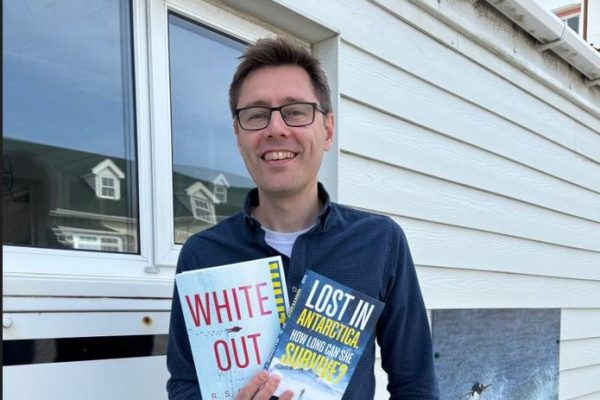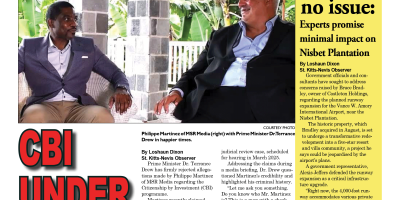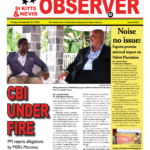“AN agonizing process” is how Falklands Islands resident Rob Burnett (42) and former Penguin News journalist describes the journey to his two-book deal with prestigious publishing house HarperCollins.
HarperFiction has acquired Whiteout, a novel set around researcher Rachael stranded in the Antarctic during a nuclear strike on the UK.
Rob has had a fascinating career in his lead up to writing Whiteout so Penguin News chatted to him about his work with tabloid newspaper Daily Mirror and as an editor for Formula 1.
Background
Rob came to the Falklands at the age of eight in 1991 with his mother and father Tony and Liz Burnett and his brother and sister. His family had lived in the islands previous to that in the 1970s at Port Howard
Rob attended the schools here and then Peter Symonds College before heading off to Leicester University to study English. He then returned to the islands and during those years did some work for Penguin News and Sulivan Shipping working alongside Debs Summers in tourism, “I also worked for Neville at the Chandlery and did various things.”
After two years Rob returned to UK to undertake a Post Grad journalism course then “I got a job on a local paper the Bucks examiner.”
From there he went to work at the Daily Mirror on the sports desk for eight years eventually becoming the digital sports editor before he joined the Formula One group as editor of the official website.
He finished there at the end 2021 to return to the Falklands but has in fact continued freelancing for F1 from the Islands.
UK tabloids aren’t known to be easy places of work so how was the Daily Mirror we asked Rob?
The reason he got in there said Rob, “was they had decided to revamp their digital offering, which was very poor and behind the times.
“It was 2009 and I don’t think I’d ever even been on their website. The Guardian was well ahead in terms of digital publishing for newspapers. So they decided to a big revamp, and they needed some young staffers to come in and help them build this up.”
Rob went in on a six month temporary contract with about seven or eight other guys “and we were working on their football website, which had always been an interest of mine.”
At the end of that six months, there was one permanent job available, “and I just sort of made sure I was in earlier than everybody else, worked a little bit harder and got that job. So I kind of snuck in,” he explained modestly.
Rob said he joined at the end of, “the glory days of Fleet Street – right at the tail end, there were still some of the big beasts of the newsroom walking around. Piers Morgan already left, so he wasn’t still there, but there was still a lot of the old boys who come in at midday, do five hours work, then go to the pub for six pints, then come back and finish the paper every day.”
Rob worked on the online section in the corner with the computers in what the old boys would refer to as “tomorrows world”
He said when he started at the paper it sold around a million copies a day, “And now I think they’d probably be below 300,000 but it still had that feel of being a big, important organization and I saw that change quite a lot.”
Being a Falkland Islander also got Rob some teasing in the office.
“At the office when I was covering the Olympics and they were doing the opening ceremony, when Argentina came out, they would all started cheering and pat me on the head. And because I support Southampton football club when they appointed an Argentine manager the following day, I came into work and there was a big picture of him on taped to my computer screen with a note saying, ‘first Southampton, next Las Malvinas!”
Rob eventually decided to move on after 8 years “I was just knackered” doing “12 hour days.”
His next job was Drive Tribe set up by Jeremy Clarkson, Richard Hammond and James May of Top Gear “which was kind of motoring interest.”
Eventually F1 reached out to him through a former Mirror colleague now working on their F1 digital publishing and offered him work as an editor.
Rob continues that same work but now remotely from the Falklands. “I do various different things for the different departments in the company. On race weekends I work for the video team, so that involves requesting, clipping up and titling little snippets such as if there’s a crash on track, or something happens on track.”
That will be sent to Rob and he will check it, title it up and publish it on the website. He will also take driver interviews listen to them and write a headline, a sub deck and publish them.
He also writes features and voice over scripts for the website.
Rob said: “the internet is by far the biggest challenge I have.” He said once he was covering the Australian Grand Prix overnight and it went off in the middle of the night for two hours. “There’s no overnight person at Sure anymore. They finish at 10 o’clock. So I didn’t even know if they knew there was a fault. I couldn’t tell my boss that my internet’s gone out because my internet’s gone out. And there have been times like that, that have been very stressful.”
Whiteout the novel
PN staff felt it was good to see a woman heroine in a survivalist thriller – what made you choose that path we asked?
Rob explained “some people have said why did you choose to do that when you’re not a woman and the answer really, is that I didn’t really choose, the story came to me and she actually was a woman.”
He added however that while it wasn’t really a conscious choice “the world was awash with male led thrillers “I didn’t think we needed another one.”
Rob said he reached out for criticism and comment from his sister Emma on his character and his agent was also a woman. Also his first reader was a woman.
He has also called himself RS Burnett on the cover because it’s not as explicit that it’s a man writing, and hopes it will open it up to a wider readership.
Asked about what inspired him to write, he said he’d been attempting to write novels for 10-12 years and had been part way through another when he had found the transcript of the BBC radio broadcast in the event of a nuclear strike on the UK.
He said, “that is the real broadcast that the BBC had prepared in the 50s/60s, I guess, during the Cold War, and it was declassified a few years ago and I found this and it’s just something that struck me about it – it’s the opening of the book.
“And I’d always thought Antarctica would be a brilliant setting for a thriller – the weather, the isolation, the dark in the winter, and so I read that broadcast, and just thought, what if you were somebody who was already alone and trapped, and then you heard that, it’s like another level of devastation.”
The rest, he said, came to him in a flood and he scribbled down ideas as fast as he could as he was terrified he would forget something.
Getting an agent let alone a deal is an incredible feat – how did it all happen?
A huge amount is luck according to Rob. He started his book in 2017 and sent it out two years later having had it assessed by someone who does manuscript assessments, “who is a novelist, and she gave me some tips and told me what absolutely wasn’t working. But she said there was something in there and as a published novelist herself that gave me the confidence to submit to agents.”
He submitted to around a dozen agents. “I got one request for the full manuscript, because you submit normally three chapters, for example, and if they’re interested, they ask for the rest.
“I got one request for the full manuscript. I got very excited about that, but then she passed. So I was bit despondent.”
He sat on it for another year and made more tweaks and sent it out to another dozen agents. Then he got one who asked for the full manuscript. He was offered representation – they didn’t hit it off but he was able to use that to tell other agents that he had had interest.
After a great deal more time had passed he eventually heard that his genre was wanted.
Rob was excited of course! “She told me the meeting was Tuesday. So I was hopping around all day.” He didn’t hear anything so thought it had fallen through but it turned out somebody had simply been on holiday. It all dragged on but eventually the good news came that an offer had been made.
It was an agonizing process said Rob, “but we got there in the end it’s perseverance and luck.”
Rob has a two-book deal with the publishing company saying ruefully but still happily “it’s not a big amount of money.”
The UK publishing date of Whiteout is February 13 but it’s available to pre-order on Amazon now. Rob is also talking to several places in the Falklands about stocking his novel. Penguin News will be including a review closer to the publication date.














